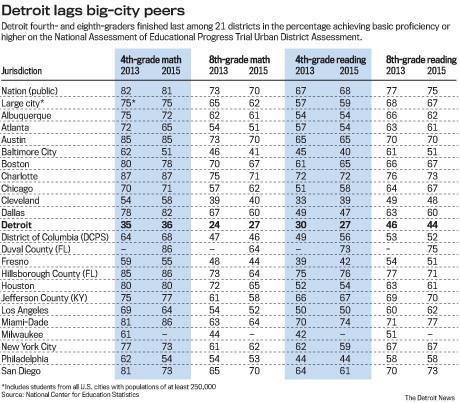To the surprise of no one.

Detroit News: For a fourth straight time, Detroit students have scored the lowest among big-city districts in math and reading, according to national test results released Wednesday.
Detroit Public Schools’ fourth- and eighth-graders lagged students in 20 other districts included in the National Assessment of Educational Progress Trial Urban District Assessment. DPS also ranked lowest in 2009, 2011 and 2013.
Achievement levels on the exam are basic, proficient and advanced. Students who score below basic lack fundamental skills. The results did include some positive news for the state’s largest district. Average scores in Detroit ticked upward in fourth- and eighth-grade math, as did basic skill rates.
In math, 36 percent of DPS fourth-graders achieved at or above basic level, up from 35 percent in 2013, while 27 percent of eighth-graders tested at or above basic, up from 24 percent.
In reading, 27 percent of Detroit fourth-graders tested at or above basic, down from 30 percent in 2013, while 44 percent of eighth-graders were at or above basic, down from 46 percent.
“Detroit has a lot of work to do,” said Peggy Carr, acting commissioner of the National Center for Education Statistics, which administers the NAEP.
Detroit has a lot of company. In statewide results from the NAEP, Michigan fourth- and eighth-graders remained below the national average in math and reading.
Despite the low scores in Detroit, DPS spokeswoman Michelle Zdrodowski said there are encouraging signs. “While these scores clearly indicate that Detroit Public Schools still has much work to do to improve student outcomes in reading and math, we are pleased that the scores appear to be leveling out,” she said. “Improvements in student achievement are at the center of the restructuring that is currently underway in DPS and is guiding all of the district’s actions and decisions.”

Changes include a “network school support structure” aimed at reducing principals’ administrative duties so they can focus on academics in their buildings, and an increased emphasis on professional development for teachers, Zdrodowski said.
Education expert Kenneth Wong, chairman of the education department at Brown University, said the test results illustrate the need for broad changes in Detroit’s education system.
“City leaders in Detroit may consider lessons on reform strategies from other cities. Equally important, policy makers in Detroit should examine the effectiveness of their current practices,” he said. “In identifying programs that work, school leaders can move toward scaling up these more successful programs. Finally, the governor and the mayor can take this opportunity to engage key stakeholders to chart a collaborative platform in school renewal in Detroit.”
Gov. Rick Snyder renewed his efforts to overhaul Detroit’s education system last week, saying he would seek legislative action by year’s end to create a debt-free city school district at a cost of $715 million over 10 years. Snyder and Detroit Mayor Mike Duggan have disagreed on how much state oversight a new Detroit school district should have.
DCG

